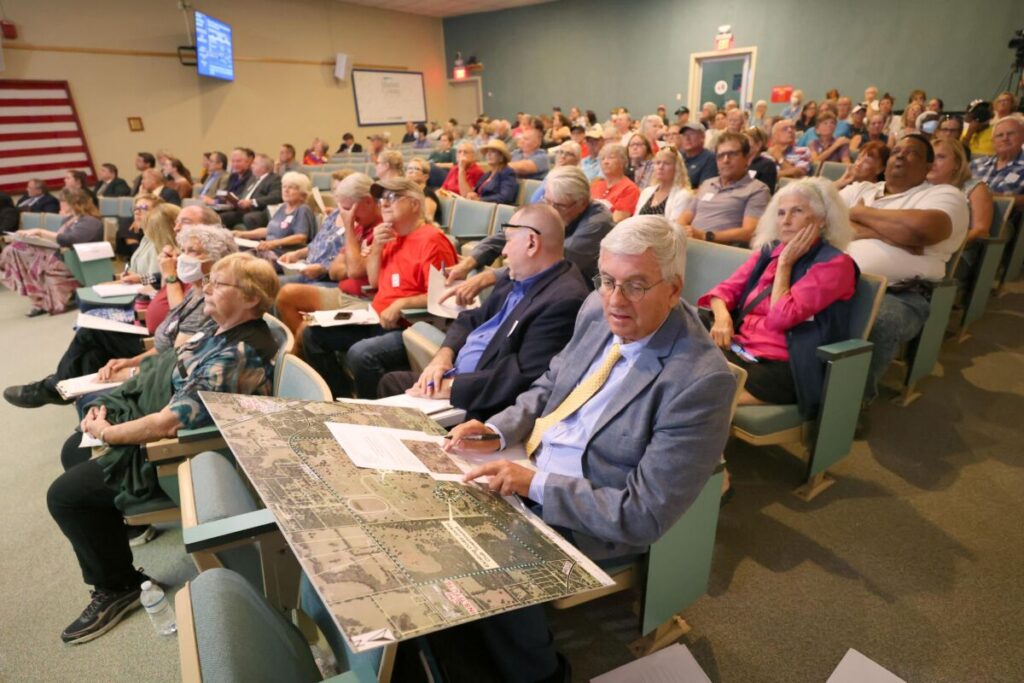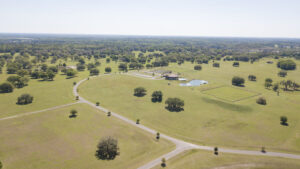Development detente
Litigation ends in settlement agreement that reduces potential adverse impacts on neighbors of planned WEC Jockey Club

File photo: Ralph Brookes, an attorney for the opposition to the WEC Jockey Club, front, works on making notes over a large satellite map as the auditorium was filled to capacity at 235, mostly with people opposed to the project, during the Marion County Commission meeting on the WEC Jockey Club development at the McPherson Governmental Complex in Ocala on Tuesday, June 21, 2022. [Bruce Ackerman/Ocala Gazette] 2022.
The developers of the WEC Jockey Club have agreed to significantly increase the minimum lot size of some site-built homes, forego a gas station, and not host car shows, concerts or music festivals on the 1,000-plus acre property, located on West County Road 318 near Irvine.
Golden Ocala Equestrian Land, LLC., also agreed to avoid development or conduct additional archeological testing at several sites identified in a recent Cultural Resources Assessment Survey (CRAS) to assess eligibility for listing in the National Register of Historic Places.
Those details, and myriad others, are outlined in a settlement agreement, a Joint Stipulation of Dismissal, that effectively ends two lawsuits filed in connection to the June 21 approval of a Planned Unit Development (PUD) on the property by the Marion County Board of County Commissioners, following changes to the county’s comprehensive plan.
For their part, the lawsuits’ petitioners agreed to not object to Golden Ocala demolishing and reconstructing the existing clubhouse on the property, (subject to approval of a proposed Master Plan by county commissioners) and to not oppose the development as long as it’s consistent with the current county approvals.
The settlement, recorded March 17 on the Department of Administrative Hearings (DOAH) website, was signed by the lawsuits’ petitioners: Damian and Rebecca Guthrie, Don Love, Michael and Jacki Robinson, Jennifer Hale and Karen E. Courchaine and the nonprofit group, Save Our Rural Areas (SORA) as well as the respondents Marion County and Golden Ocala.
The petitioners all own property adjacent to or near the Jockey Club, while SORA fights uncontrolled growth in the county’s Farmland Preservation Area, which includes the Highway 318 corridor.
Attorney Ralf Brookes, a land use expert who represented the plaintiffs, Monday issued a press release on SORA’s behalf.
“The main achievements that SORA fought hard for are assurance that neither a hotel nor a gas station will be constructed on the Ocala Jockey Club land,” the release stated. “And that events located on the property will be limited to equestrian activities only with the sole exception being the use of fields for amateur youth sporting events.”
Love said Wednesday he and his neighbors were overall pleased with the settlement.
“We are in favor of it, but have some hesitations about the site-built homes,” he said. “But if Golden Ocala duplicates WEC Ocala, the whole neighborhood will enjoy the complex.”
Another concern is the Fort Drane issue, Love said. “We don’t know what’s going to happen with that,’’ he said.
Fort Drane was a Second Seminole Indian War fort located on the 3,000-acre plantation of Gen. Duncan L. Clinch, which included all or part of the Jockey Club property.
The CRAS was done in response to a letter from the Florida Division of Historical Resources, as part of a review by state agencies in response to the county’s proposed comprehensive plan changes, that mentioned Fort Drane being in the general vicinity of the property. (See related story in this issue)
Attorney Jimmy Gooding, who represents Golden Ocala, declined to comment via email for this story. County Attorney Matthew “Guy” Minter has not responded to several emails requesting an interview.
He did note the settlement in the March 7 Board of County Commission meeting.
“Last week, we spent an afternoon amongst the parties and were able to work out a settlement of the challenges of the opponents of the plan,” he said. “So, the settlement would resolve both the comp plan challenge and the rezoning challenge.”
Minter also said the settlement included setting aside cultural areas, including “like what might be the remains of Fort Drane from 1835.”
The issue of the hotel was addressed during the June meeting, when Golden Ocala agreed to remove it from consideration prior to the county commissioner’s vote. The county also imposed lighting requirements and approved a redesign of the entrance sign in the developer’s conceptual plans during the meeting, which was noted in the settlement.
In its statement, SORA said the agreement will limit the disturbance of the adjacent neighbors and wildlife.
“The possibility of music festivals, concerts, car shows, and motor sports events would have been incompatible with the Farmland Preservation Area,” it said.
The settlement stipulates the lot size of suit-built homes near the Guthrie’s farm on County Road 225 must be a minimum of six-acres, up from the three-acre minimum approved in June. It also mandates that properties on the southeastern property boundary, where the Guthries live, will be protected by a larger Type C buffer.
Water and sewer plants, if built in the future, would be required to be at least 1,200 feet away from farms and neighbors in that southeastern boundary as well, and manure generated by horses participating in WEC Jockey Club equestrian events must not be disposed of on the property, according to the settlement.
Meanwhile, the petitioners also acknowledged and agreed that Golden Ocala’s development of the property is presently uncertain and that some provisions of the agreement may no longer be necessary or appropriate in future years.
The legal challenges followed a controversial 3-2 June vote by the Marion County Board of County Commissioners adopting amendments to its Comprehensive Plan’s future land use map and subsequent approval of Golden Ocala’s application for rezoning the land from mostly agriculture to a PUD. Commissioners Craig Curry and Kathy Bryant voted against the project.

The Ocala Jockey Club shown Monday, March 20, 2023, in Reddick. The facility CR 318 was recently sold to the World Equestrian Center. Alan Youngblood/Ocala Gazette
Golden Ocala, owned by the family of the recently deceased Larry Roberts, founder of R+L Carriers, a long-distance trucking company, including his wife, Mary, also developed the World Equestrian Center in Ocala.
The developer purchased the former Ocala Jockey Club in August of 2021 for $10.5 million and soon announced its intentions to create a second similar multi-use venue, with site-built homes, a 100-site RV park, stadiums, polo fields, as well as commercial and retail space.
Dozens of concerned area residents, including Damian Guthrie, spoke out against the project at the June meeting, and county staff recommended denial for both the amendments and rezoning from county staff. Even so, commissioners Michele Stone, Jeff Gold and Carl Zalak III voted for it.
Brookes then filed in July two legal challenges to the PUD: one challenging the county’s rezoning of the property, and the other, a request for a Formal Administrative Hearing disputing the commissioner’s adoption of the amendments to its comprehensive plan.
Now that the lawsuits have been settled, SORA said it can continue its mission of fighting urban sprawl and unwanted growth on rural lands.
“This is a sound beginning of continued efforts to protect the FPA and our rural way of life,” said SORA in the release. “This settlement presents a strong willingness of all parties to keep commercial development out of the Farmland Preservation Area and maintains the one in ten rule.’’





